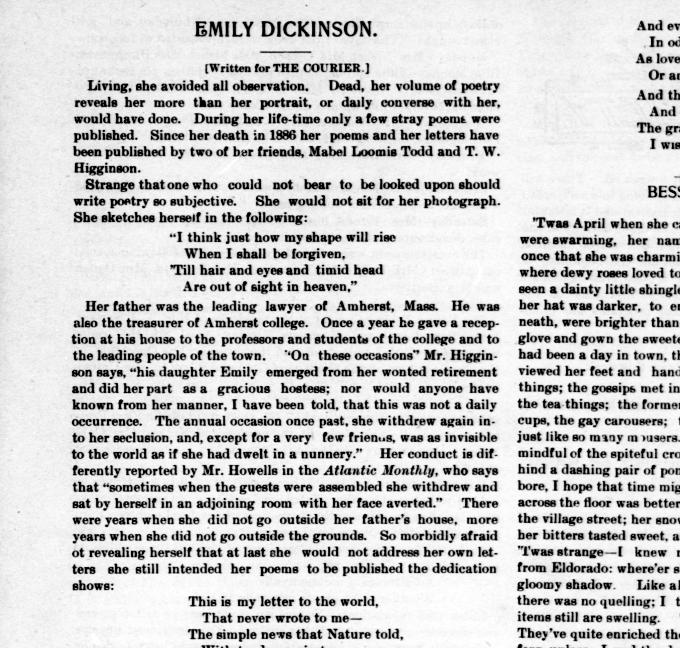|
Moderated by NW Okie! |
Volume 17 , Issue 172015Weekly eZine: (371 subscribers)Subscribe | Unsubscribe Using Desktop... |
Emily Dickinson Poetry

In The Courier, out of Lincoln, Nebraska, dated 6 April 1895, page 3, we find this Concerning Emily Dickinson. We know, living, Emily Dickinson avoided all observation and was a recluse. But dead, Dickinson's volume of poetry reveals her more than her portrait, or daily converse with her, would have done.
During her life time only a few stray poems were published by two of her friends, Mabel Loomis Todd and T. W. Higginson.
Is it strange that one who could not bear to be looked upon should write poetry so subjective? Dickinson would not sit for her photograph. She sketches herself in the following:
"I think just how my shape will rise
When I shall be forgiven,
'Till hair and eyes and timid head
Are out of sight in heaven,"
From the article we learn that Emily's father was the leading lawyer of Amherst, Massachusetts. He was also the treasurer of Amherst college. Once a year he gave a reception at his house to the professors and students of the college and to the leading people of the town.
"On these occasions" Mr. Higginson said, "his daughter Emily energed from her wonted retirement and did her part as a gracious hostess; nor would anyone have known from her manner, I have been told, that this was not a daily occurrence. The annual occasion one past, when withdrew again into her seclusion, and, except for a very few friends, was as invisible to the world as if she had dwelt in a nunnery."
Emily's conduct was differently reported by Mr. Howells in the Atlantic Monthly, who said that sometimes when the guests were assembled she withdrew and sat by herself in an adjoining room with her face averted. There were years when she did not go outside her father's house, more years when she did not go outside the grounds. She was so morbidly afraid of revealing herself that at last we would not address her own letters she still intended her poems to be published the dedication shows:
This is my letter to the world,
That never wrote to me-
The simple news that Nature told,
With tender majesty.
Her message is committed
To hands I cannot see;
For love of her sweet countrymen,
Judge tenderly of me!
The article goes on to read: "Once the public is sure genius is not posing but really wishes to conceal itself it never turns its eyes away form the hiding place. Emily Dickinson would not mingle with her neighbors. She may not have known enough about them to guess that she herself was a subject of comment to them. Her queer ways must have been a boon to the dwellers in a monotonous New England town.
"They do say that Emily Dickinson has not been out of her front gate for five years." There are great possibilities for the gossips in this opening sentence. When was matinees and federation to Amherst as soon as she got old enough o know what she did not want todo.
Mr. Howells and Mr. Higginson gave he high rank among pets. The compared her to Heine and to Blake. In the Atlantic Mr. Woodberry said she was unworthy the comparison and that oblivion waits for morbid poetry. When eh first critic in America said so it was probably true.
Dickinson's sympathy with nature was constant and close. Her poetry reminded those of Emerson, of Hiene of Thoreau.
the Grass
The grass so little has to do-
A sphere of simple green,
With only butterflies to love,
And bees to entertain,
And stir all day to pretty tunes
The breeze fetch along,
And hold the sunshine in its lap
And bow to everything:
And thread the dew all night, like pearls,
And make itself so fine-
A duchess were too common
For such a noticing.
| View or Add Comments (0 Comments)
| Receive
updates ( subscribers) |
Unsubscribe
| © . Linda Mcgill Wagner - began © 1999 Contact Me | |
